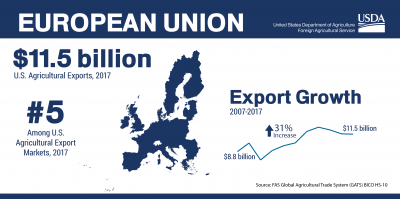Tariffs imposed by the Trump administration collected an estimated $958 million in revenue from selected agricultural inputs from February to October of 2025, according to North Dakota State University's monthly…
After Updated KORUS and USMCA, U.S. Trade Agenda Continues
After recently signing a new KORUS (United States-Republic of Korea) Trade Agreement, and reaching an agreement on a revised North American Free Trade Agreement with Canada and Mexico, the U.S. Trade Representative’s Office signaled this week that the U.S. will start trade talks with Japan, the EU and the U.K. soon.
Trade Agenda: Japan, EU and U.K.
Bloomberg writer Jenny Leonard reported earlier this week that, “The Trump administration officially notified Congress that it will start trade negotiations with Japan, the European Union and the U.K. as soon as three months from Tuesday.
“‘We will continue to expand U.S. trade and investment by negotiating trade agreements with Japan, the EU and the United Kingdom,’ U.S. Trade Representative Robert Lighthizer said in a statement Tuesday.
Clearly @POTUS has momentum, based on his success with the newly-negotiated #USMCA deal with Mexico and Canada, along with the new #KORUS agreement with South Korea. The dominoes are falling, and this announcement is another step in a great direction. Good for agriculture. https://t.co/MMr9jqKxXn
— Sec. Sonny Perdue (@SecretarySonny) October 16, 2018
“The notification is a procedural step under U.S. trade law that is required 90 days before the U.S. enters into negotiations with other countries. The White House cannot engage in official talks before the three-month window is over and needs to closely consult with Congress during that period to ensure it’s fulfilling the objectives laid out in the law.”
"#Japan, #EU, U.K. Next on U.S. #Trade Negotiation Radar," https://t.co/9Y99sRvZQL (MP3- 1 minute). @USDA Radio. Remarks from @SecretarySonny pic.twitter.com/LS9MBHOegU
— Farm Policy (@FarmPolicy) October 17, 2018
The Bloomberg article added that, “Lighthizer said he wants to start trade talks with Japan and the EU ‘as soon as practicable’ but no earlier than 90 days from Tuesday. He said the administration intends to start negotiations with the U.K. ‘as soon as it is ready after it exits from the European Union on March 29, 2019.'”

Adam Behsudi reported on Wednesday in Politico’s Morning Trade newsletter that, “The [three USTR notification letters (Japan, EU and U.K.)] shed little light on what the U.S. specifically will include in the scope of any talks. U.S. Trade Representative Robert Lighthizer said he will comply with the broad negotiating objectives laid out by Congress in the TPA legislation. On the Japan and EU talks, the letters say the aim of negotiations is to ‘address both tariff and non-tariff barriers and to achieve fairer, more balanced trade.'”
Mr. Behsudi also pointed out that, “Preparatory talks with Brussels, Tokyo and London have provided a small glimpse into what could come out of the talks. A joint statement between the U.S. and Japan clearly stated U.S. expectations that a deal would increase auto production and jobs domestically and that Japan would not go past its previous deals on opening its market to agricultural imports. The U.S. had negotiated bilaterally with Japan in the Trans-Pacific Partnership talks, for which Tokyo made unprecedented openings to its sensitive agricultural market.”

On Wednesday, Senate Ag Committee Chairman Pat Roberts (R., Kans.) stated that, “I am very encouraged by the administration’s announcement to pursue trade agreements with Japan, the European Union, and the United Kingdom.
President Trump and Trade Representative Lighthizer recognize these are critical markets for farmers, ranchers, and other businesses, representing hundreds of billions of dollars in exports of U.S. goods and services.
“I appreciate the Trump administration’s work to ensure American agriculture has a seat at the negotiating table.”
USMCA (U.S.-Mexico-Canada Agreement), Next Congress
Meanwhile, Bloomberg writer Jenny Leonard reported Tuesday that, “President Donald Trump’s renegotiated trade deal with Mexico and Canada won’t get a vote in Congress this year, Senate Majority Leader Mitch McConnell said, setting up a potential contentious fight with Democrats next year over a signature White House accomplishment.
“‘My trade advisers say you can’t possibly do it under the various steps that we have to go through. I had not heard that it might be possible to address it this year,’ McConnell said in an interview with Bloomberg News Tuesday in Washington.
In our exclusive interview, Mitch McConnell rules out a vote on the new Nafta trade deal before 2019 https://t.co/FYFGRAGjzc pic.twitter.com/gPmo0I0uma
— Bloomberg TV (@BloombergTV) October 16, 2018
“Waiting until next year for Congress to approve the measure opens the possibility for Democrats to seek concessions from the White House if the party wins a majority in the House in midterm elections Nov. 6.”
China
In her Bloomberg article, Ms. Leonard noted: “Asked about the administration’s trade policy more broadly, including U.S. tariffs on Chinese imports, McConnell said he’s taking a wait-and-see approach. He said Trump ‘deserves to have a little slack cut here and that’s what we’re doing‘ to improve America’s trade relationships in the longer term, he said.
.@POTUS on China trade: "It's hard for them to do a deal because they've had it so good for so long." pic.twitter.com/gxvZiEybgQ
— FOX Business (@FoxBusiness) October 17, 2018
“‘I’m not a big fan of tariffs but I’m certainly happy we seem to have settled the situation with Canada and Mexico,’ McConnell said in the interview. ‘And if the short-term trade war ends up producing a better relationship with China, that would be great.'”





